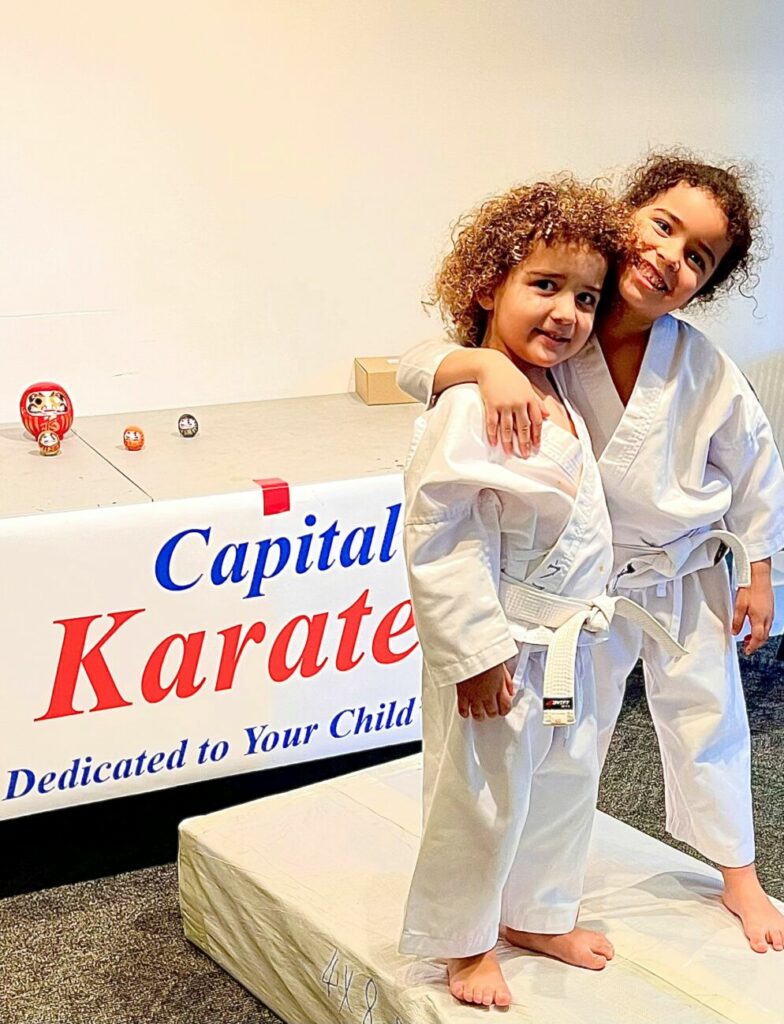Teaching children karate is without question the most rewarding job a person can have. That is just my opinion, of course. When I began to teach, many, many years ago I did it because I thought karate was great. But I didn’t realize what “great” really meant. It wasn’t until I was teaching for a while and saw young children go through the positive changes that karate brings about that I understood why karate was great.
For example, I would meet coaches who coached kid’s soccer, or little league or water polo and they would tell me they could spot the karate kids right away. This was, according to them, because karate not only teaches self-defense skills but also skills that can be used across other sports. Anyone who ever coached kids, especially younger kids can appreciate it when they see a young child focus, concentrate and show respect.

As a dad (I have five children—three adults and two young children) I love being involved in my children’s lives. I always volunteer to go into their classroom and do whatever the teachers need. I see it as an opportunity to see my kids in an environment where they spend a great deal of their time: school. Inevitably, there would be kids in the classes that were also karate students of mine. The teachers, without fail, would ask me to come to the classroom and give a class because they, too, saw the respect, the ability to concentrate and focus that the karate students had.
Read more: Learn more about Peled’s parenting journey in his Parent You Should Know Q&A
Parents who would sit in my karate classes to watch told me that there was one thing they not only loved the most, but thought was magic. Each karate class begins with two simple things. First, we make sure we place our shoes neatly, (karate is practiced barefoot) and second, we sit silently with our eyes closed for 10 seconds. Suddenly, a group of rowdy active kids who like nothing more than to run around are sitting silently. There could be 10, or 20 or even 30 of them, depending on the class, and the whole world suddenly stops. Suddenly, all these children, like little angels in white uniforms, sit quietly without fidgeting, without laughing but just sitting quietly and being in the moment. Sounds like magic, I know.
It was the parents who told me how pleasantly surprised they were when at the dinner table their 7-year-old would explain the meaning of discipline. Discipline, everyone can agree, is a crucial life skill. But how do you explain it to children, many of whom think that discipline means “to be disciplined,” for doing something they shouldn’t? It is a great life skill that we can cultivate and helps us in every aspect of our lives and at almost every age. When it is taught regularly, as it is done in karate, it becomes part of the child’s life.
So, it was really through other people, parents, coaches and teachers that I came to realize just how great karate was for children. Personally, I loved karate from the minute I started and that love never stopped. I was 16 when I began, and to this day, more years than I can count later, I still feel like a kid when I put on my karate suit and belt and go to class.
Still, self-defense is the skill that most people imagine one learns from karate. But what is self-defense? Well, it’s more than just knowing how to block, kick or punch. The most important part of self-defense is knowing how to avoid situations where we might be in danger. Then, if we are confronted with danger, how do we deal with it safely, keep our cool and ultimately end it with everyone being able to go home unharmed?
So, that is a lot to unpack, which is why karate is a path. The full name of karate is Karate-Do, the way of karate, or the way of the empty hand. Why empty hand? Because in karate, we learn to defend ourselves when we have nothing but our hands, our bodies to use. We need all the life skills we can muster to live a life where we can avoid situations that are potentially dangerous. We need these skills to defuse potentially dangerous situations, and then we need the skills to defend ourselves if we have no choice but to fight.
In karate, we cultivate all these skills. People always ask me if I had ever used my karate skills. What they mean is, have I ever had to fight to defend myself? The answer is no and yes. I never had to use my fighting skills in a fight, but I use my karate skills every day—or at least, I try to. Every challenge I face, every difficulty, every moment of every day karate is like a bag full of treasures that I can pluck something out of and use. The follow up question is, “Well, if you never used karate, how do you know it works?” And the answer is, that is how I know. If we never have to use our fighting skills to fight, it means we are using karate all the time.
Miko Peled is excited that after a 10-year break, he is teaching karate again, at Capital Karate, in the Adams Morgan neighborhood of Washington, D.C. Capital Karate offers classes for ages 4 and older at The Potter’s House, 1658 Columbia Road NW, every Monday and Wednesday. A free, private trial class is available by appointment via capitalkarate.org.








Sensei Miko Peled is a fantastic instructor..I was lucky enough to train under him when he taught at his school in California